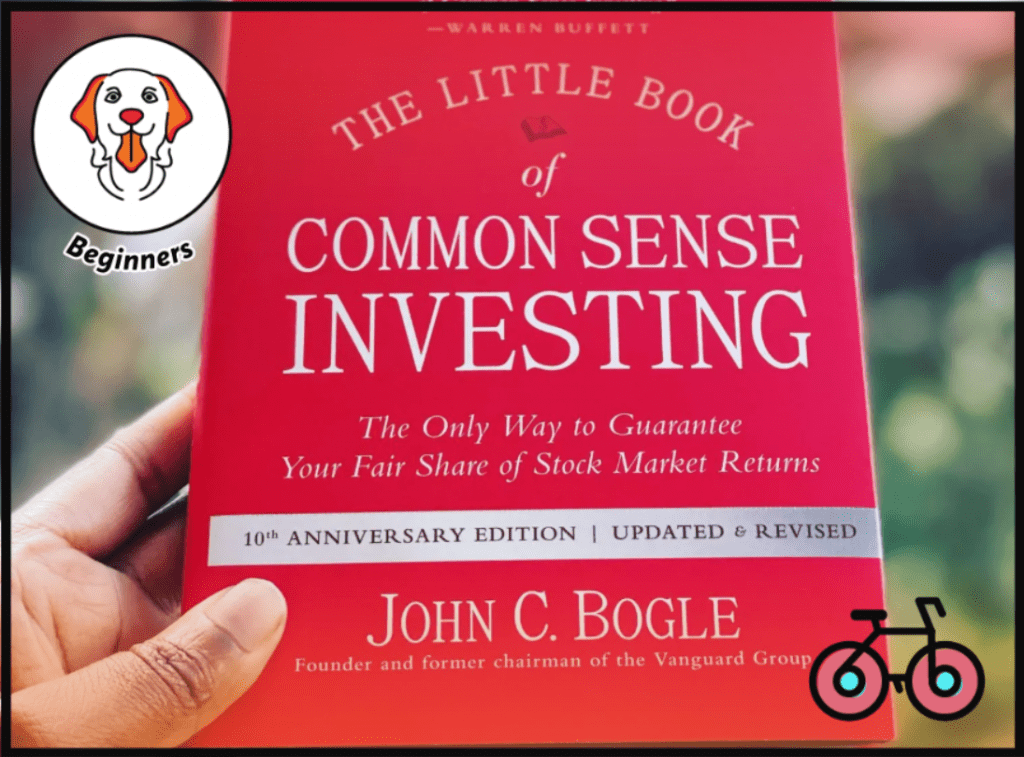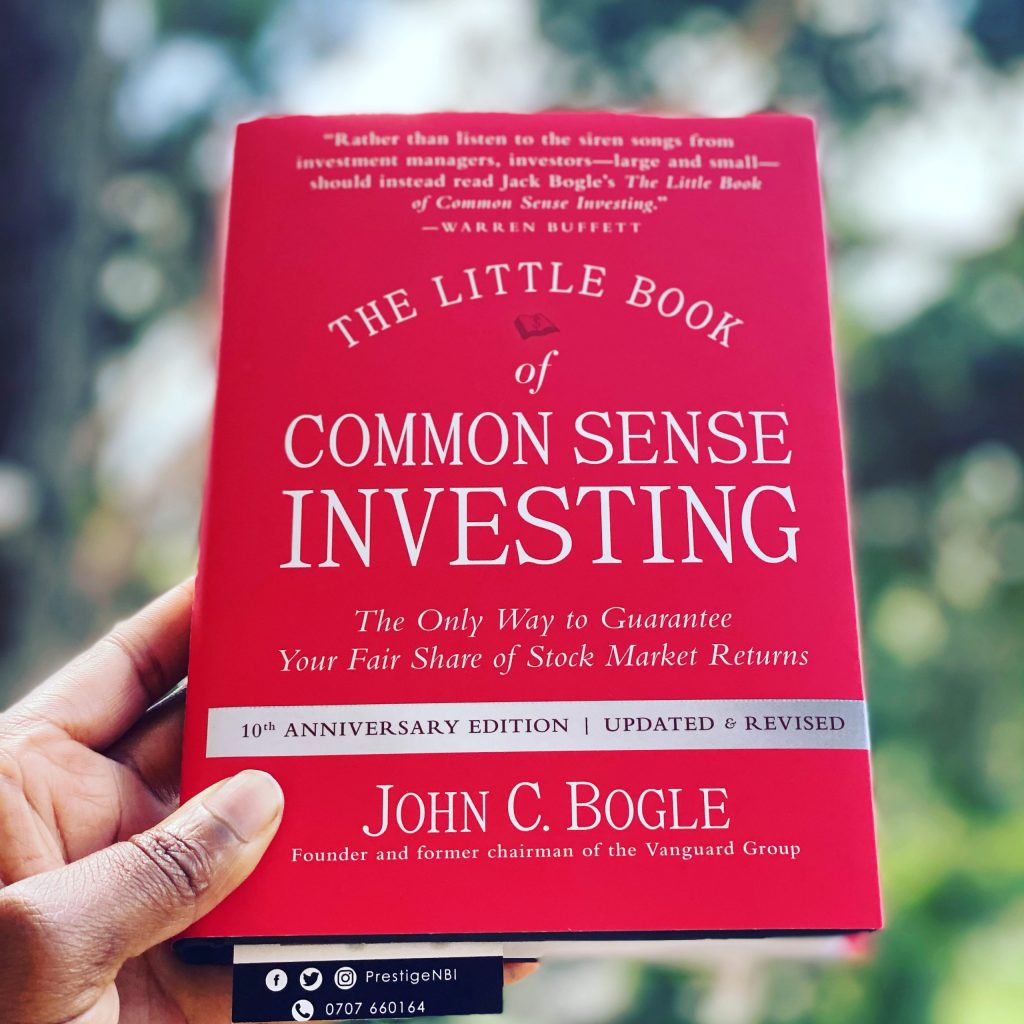Little Book of Common Sense Investing 2017 Review
THE Fiddling Volume OF COMMON SENSE INVESTING (Volume REVIEW)

The Footling Book of Mutual Sense Investing past John C. Bogle, published in 2007, is an account of why the author is in favor of using index funds when investing.
In essence, the advice is simple: invest in a wide market index fund and hold for the long term.
Only Bogle goes into detail about why such a strategy will produce above-average results and what factors affect your investment the most.
Although his examples are based in the US, the same principles can be applied to investors all over the earth.
Let's have a closer wait at Bogle's advice and how information technology could apply to you.
Jack Bogle Interview on Unproblematic Investing
The grim irony of investing, then, is that we investors as a group not only don't get what nosotros pay for, we go precisely what we don't pay for. So if nosotros pay for nothing, we go everything.
SNAPSHOT
Who Is John C. Bogle?
Before nosotros dive into the lessons this book imparts, it's important to discuss the human behind the piece of work.
John C. Bogle is arguably one of the most important figures in the financial world.
He created the large investment house Vanguard, which is the simply company of its kind that is owned by its investors.
We take a separate commodity on Bogle and Vanguard for Europeans.
What's more, he as well created the first-ever index fund.
Equally such, he has changed the way many people invest and has fabricated good stock market returns accessible to the masses.
Aside from his work at Vanguard, he was also considered a philanthropist, regularly donating upwards to one-half of his annual salary.
Even later on his death in 2019, Bogle is nevertheless revered by investors all over the earth.
And so, What Happened to the Gotrocks?
The Little Book of Common Sense Investing starts with a parable that explains the way the stock market works.
Bogle asks u.s.a. to imagine that one family, chosen the Gotrocks, owns the entire US market.
Each member has an alphabetize fund, and so they all earn the same almanac percentage on their money.
Simply one solar day, a 'helper' approaches some of the Gotroks and states that they could outperform the other family members.
This fund manager charges a fee, and the Gotroks begin to merchandise shares among each other.
Shortly, more 'helpers' arrive, and the wealth is suddenly distributed unequally.
Even though some Gotroks are now wealthier, the family as a whole no longer performs every bit well as before. This is because the helpers are at present taking a cutting.
They now simply receive the market place return minus the helpers' fees. Thus, they were all, on average, better off without these managers.
Similarly, we investors as a group earn what the market place returns minus the diverse fees we have to pay.
WHAT You lot Will Learn
YOUR FAIR SHARE
How the Stock Market Actually Works
The Gotroks parable illustrates conspicuously how the stock market actually works.
The fact that we earn the market average minus fees is obvious, but it's not something nigh of us recollect about often.
In fact, I hadn't fully realized the implications of this until reading almost information technology in the book.
Bogle reminds us that every time we win in the stock market place, someone else loses.
Earning more than than average is a loser's game because it is very hard to do over the long term, especially because speculation usually comes with high fees.
Nevertheless, earning our fair share is easy with the utilize of index funds.
By using this strategy, we tin outperform almost everyone who uses higher-fee products.
It takes wisdom to know what we don't know
ACTIVE INVESTING
How Many Fund Managers Actually Outperform the Marketplace?
Bogle analyzes the results of mutual funds and how often they do amend than an S&P 500 index fund.
He plant that, within 36 years, most ⅔ of the funds studied went out of concern.
Only i in 14 outperformed the market place over this time period. What's more, many of the ones who did only outperformed early, and a change in management or a growth in size has slowed their success.
Thus, whatsoever investors who entered these winning funds in the second half of the time menstruum studied have experienced subpar results.
Fees and Taxes: The Reason They Underperform
The reason the deck is stacked against mutual funds is that they charge fees many times higher than alphabetize funds.
Equally such, they must already overcome a meaning hurdle earlier they tin simply break even.
What's more, they are often tax-inefficient because of the corporeality of trading that goes on.
If you hold your funds in a taxable account, yous should pay special attention to your fund manager's strategies because you might have to spend a meaning chunk of your returns on taxes.
In dissimilarity, the alphabetize fund is usually remarkably tax-efficient because trades are kept at a minimum.
Buying funds based purely on their by functioning is ane of the stupidest things an investor can do.
Marketplace Timing: The Reason You Underperform
Did you know that well-nigh people don't fifty-fifty come shut to earning the returns their funds advertise?
I was surprised by this information, but it makes sense when you consider the emotions that go forth with investing.
The virtually heavily promoted funds are the ones that take recently done well.
At that indicate, investors all start to pile in, in the hopes that this superior performance volition be sustained.
Simply mostly, this isn't the case.
Reversion to the mean takes hold, and investors who got in too late take the hit.
Once operation has declined, they decide to sell, often at a loss.
For this reason, most people actually practise worse than their funds' returns seem to suggest.
Are Helpers Ever Helpful?
In general, the author believes that most people can run their own portfolio.
Merely hold i wide-market index fund and one bond index fund, and that's all you'll demand.
As seen in the Gotroks example, consultants equally a group reduce the total gain of all investors.
Thus, you shouldn't pay someone else a 1-2% fee to selection stocks or funds for you.
Yet, Bogle states that good advisors have other functions.
They can help you optimize your financial life because they can make your portfolio tax-efficient, and they can prevent you from making bad decisions.
If y'all need an advisor, cull someone who charges past the hour and doesn't take a cut of your portfolio.
What Should You Do Now?
The last chapter focuses on helping y'all make some decisions about the future, at present that you understand how the investment world works.
Bogle states that almost readers won't implement his simple portfolio because market place timing is too tempting.
For this reason, he suggests putting 95% of your savings into a "serious money account", which is your index fund.
The other 5% makes up your "funny money account".
Yous tin can cull to invest in individual shares and mutual funds with this portion.
Over time, you should track the two accounts to run across which one performs better over i, five, and 10 years.
Bogle is confident that your "serious money account" volition do best in the long run.
SHOULD YOU BUY THIS Book?
How nosotros rated the volume
Rating justification
The Little Volume of Common Sense Investing by John C. Bogle is an fantabulous business relationship of why the index fund outperforms almost all other investments in the long run.
The author explains the stock market place in detail and shares his view on how the average investor can attain to a higher place-average results.
Although the data is easily understandable for everyone, it is targeted at people gear up to invest or already investing.
Someone at the very start of their career or unsure most how to start saving coin might find the information likewise much.
Bogle is an American and therefore writes for a United states audience.
Thus, the investment advice isn't specific to European countries, even though the principles apply regardless.
The volume shines when it comes to explaining investment concepts coinciding with the financial independence principles.
While Bogle is a giant in this field, he ends each chapter by deferring to other experts, who echo his views.
His humility and want to help each investor achieve their fair share is what makes his work shine.

Like resources

Is Vanguard the All-time ETF Provider?
In 2008, Warren Buffett, the Oracle of Omaha, threw down the gauntlet to his friends over at the aristocracy hedge funds. The challenge?
He stated that, with all their genius and intellectual firepower, hedge fund returns could not shell the returns given by the humble S&P 500 Index Fund over a nine-year period. The consideration? A mere million dollars.
Read More »

Vanguard LifeStrategy available in Europe! A Retriever Portfolio in Ane ETF
Imagine, that your Dad or cousin didn't invest in that pharma stock a while ago that initially surged, and then stagnated and in the stop underperformed the market.
Considering most of them do.
At present, he doesn't even want to sell it anymore because of the emotional attachment. Imagine he didn't take to think virtually when selling or buying. Or fifty-fifty rebalancing.
Read More »
SHARE THIS ARTICLE
BROWSE ALL OUR RESOURCES
DISCLAIMER
All information found here, including whatsoever ideas, opinions, views, predictions expressed or unsaid herein, are for advisory, entertainment or educational purposes only and do not establish fiscal advice. C onsider the appropriateness of the information having regard to your objectives, fiscal situation and needs, and seek professional advice where advisable. Read our full terms and conditions.
Source: https://www.bankeronwheels.com/the-little-book-of-common-sense-investing-book-review/
Post a Comment for "Little Book of Common Sense Investing 2017 Review"